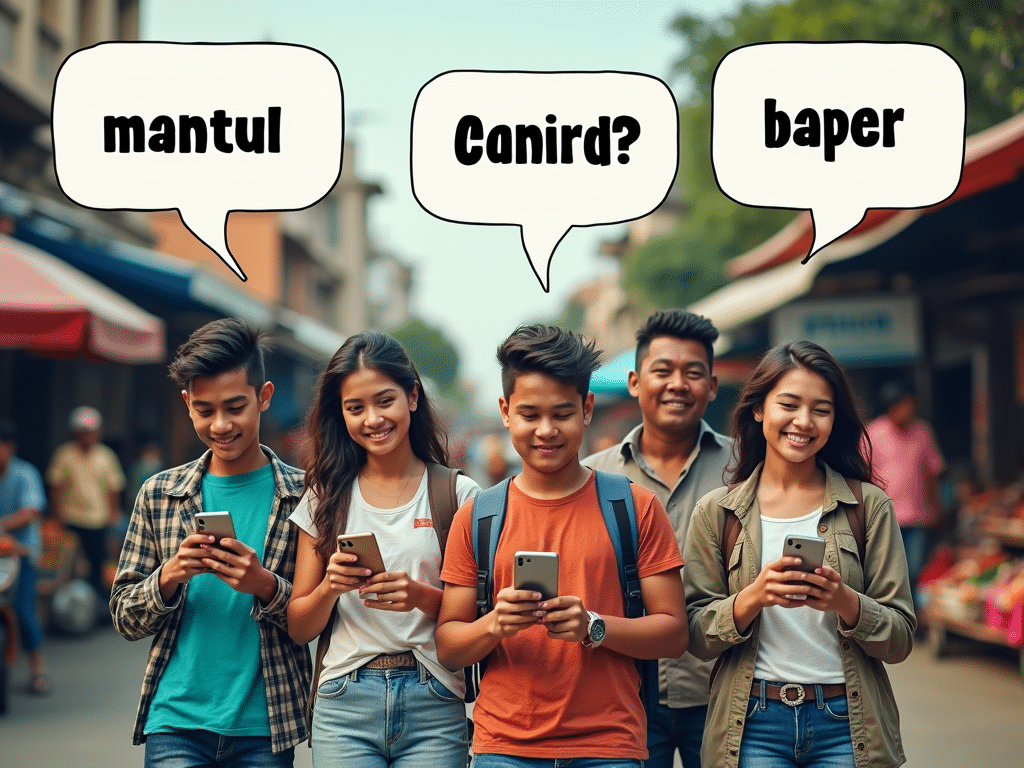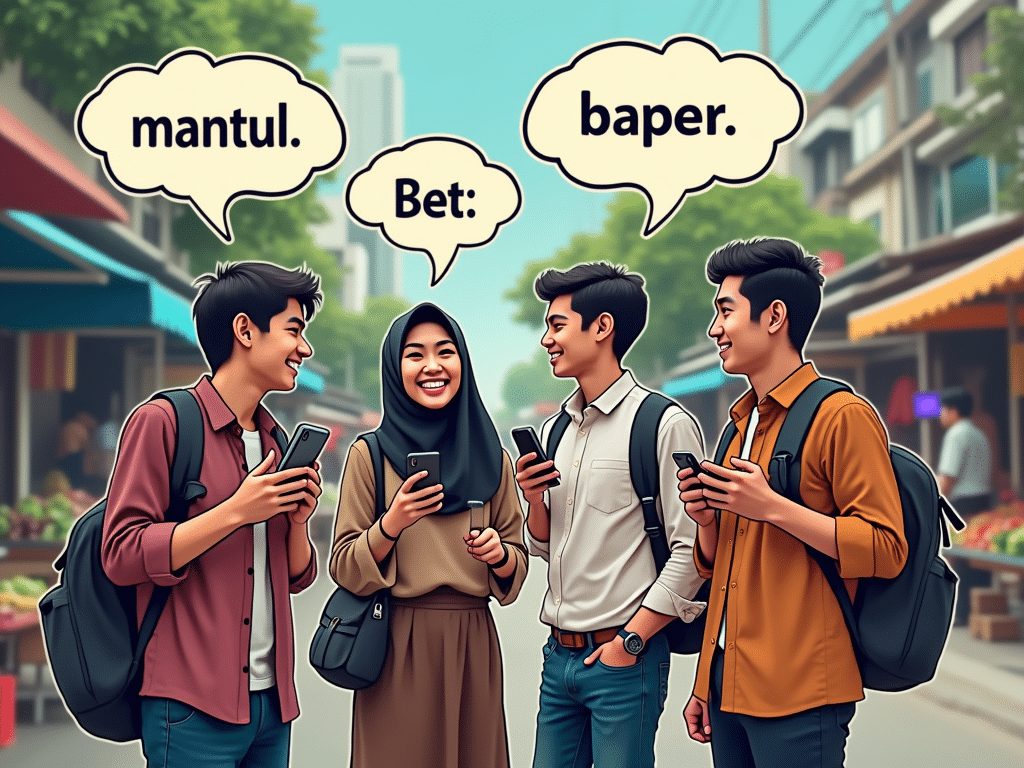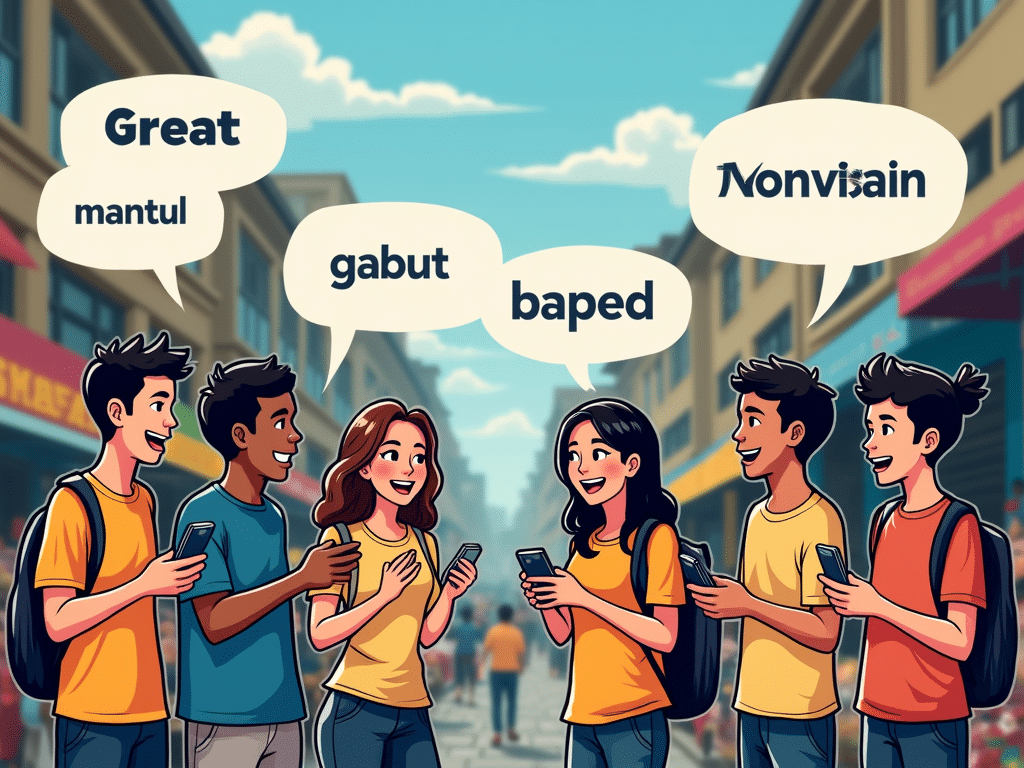Hey there, slang enthusiasts! 👋 Ready to dive into the world of Indonesian slang? Whether you’re planning a trip to Bali or just want to sound cool chatting with Indonesian friends online, knowing some slang is a must. Indonesian slang words are the secret sauce that’ll make you sound like a local in no time. So, let’s get started with 20 essential Indonesian slang words that’ll have you talking like a pro!
| Key Takeaways |
|---|
| 1. Indonesian slang is constantly evolving, influenced by youth culture and social media |
| 2. Learning slang enhances communication and cultural understanding |
| 3. Proper context and usage are crucial when using slang |
| 4. Regional variations exist in Indonesian slang |
| 5. Slang often reflects current trends and societal changes |

The Lowdown on Indonesian Slang
Alright, let’s break it down. Indonesian slang, or “bahasa gaul” as the locals call it, is like a living, breathing thing. It’s always changing, picking up new words and dropping old ones faster than you can say “nongkrong” (that’s “hanging out,” by the way).
Think about it – slang is where the real action is in any language. It’s how people actually talk, not the stuffy textbook stuff. And in Indonesia? It’s no different. From bustling Jakarta to laid-back Bali, slang is the heartbeat of everyday chatter.
Essential Indonesian Slang Words
Personal Pronouns
- Gue: This is how you say “I” or “me” when you’re keeping it casual. It’s like saying “I” but with extra coolness points.
- Lo: When you’re talking to your buddy, use “lo” instead of “you.” It’s friendly and chill.
Expressions of Emotion and State
- Anjay: This word is like a Swiss Army knife of expressions. Surprised? Anjay! Excited? Anjay! It’s the go-to word for pretty much any strong emotion.
- Galau: Ever felt confused or troubled, especially about love? That’s galau. It’s that “should I text them or not?” feeling.
- Baper: Short for “bawa perasaan,” this describes someone who catches feelings way too easily. We all know that friend, right?
Social Interactions
- Cuy: It’s like “dude” or “mate” in English. Use it when you’re being friendly with your pals.
- Nongkrong: This is what you do when you’re hanging out with no real plan. Just chilling, maybe grabbing a coffee, or scrolling through TikTok together.
- Gaul: If someone’s gaul, they’re sociable and trendy. It’s like being “with it” or “cool.”
Describing People and Situations
- Kece: When something’s super cool or awesome, it’s kece. It’s short for “keren sekali.”
- Alay: This is for someone who’s over-the-top or attention-seeking. Think of that friend who posts every single thing they do on Instagram.
Using Slang in Context

Now, let’s see how these words come together in real life:
“Cuy, gue lagi galau nih. Lo mau nongkrong ga?”
(Dude, I’m feeling troubled. Wanna hang out?)
See how natural that sounds? It’s way more relatable than textbook Indonesian. But here’s a pro tip: like with any slang, context is key. You wouldn’t use “gue” when talking to your boss or your friend’s grandma. Keep it for your peers and casual situations.
Regional Flavors of Slang
Here’s something cool – Indonesian slang isn’t the same everywhere. Each region has its own special words. It’s like how American and British slang can be totally different. In Jakarta, you might hear a lot of “gue” and “lo,” but head to Surabaya, and you’ll pick up different vibes.
Slang in Pop Culture
Wanna really get into Indonesian slang? Check out some Indonesian music or movies. Artists like Rich Brian (yeah, he’s Indonesian!) drop slang in their lyrics all the time. It’s a fun way to learn and stay up-to-date with the latest lingo.
The Slang-Formal Language Dance
Sometimes, slang words become so popular that they sneak into more formal Indonesian. It’s like how “LOL” started in chat rooms and now even your mom uses it. Language is always changing, and slang is often the starting point.
Tips for Slang Newbies
- Listen more than you speak at first.
- Don’t overdo it – using too much slang can sound try-hard.
- When in doubt, ask a local friend if a word is okay to use.
- Keep up with social media trends – that’s where new slang often starts.
Remember, using slang is about more than just knowing the words. It’s about understanding the culture and the context. It’s like being in on an inside joke with an entire country!
So there you have it – your starter pack for Indonesian slang. Ready to sound like a local? Give these words a try next time you’re chatting with Indonesian friends. And hey, if you’re into other cool slang, check out our articles on FOMO or WAGMI. Who knows, maybe you’ll find some global slang crossovers! 🌍🗣️
Practicing Your Slang Skills
Now that you’ve got a solid list of Indonesian slang words, it’s time to practice! Here are a few fun ways to incorporate them into your daily life:
- Chat with Friends: Use these slang words in your texts or social media posts. Try sending a message like, “Anjay, this movie is so kece!” and see how your friends respond.
- Watch Indonesian Content: Dive into Indonesian YouTube channels, movies, or TikTok videos. Pay attention to how the creators use slang in their conversations. It’s a great way to pick up new phrases and understand the context better.
- Join Online Communities: Look for forums or social media groups focused on Indonesian culture. Engaging with native speakers will help you learn more about the nuances of slang.
Slang Evolution and Trends
Just like fashion, slang evolves. New words pop up, and old ones fade away. For example, terms like “receh” (used by Gen Z to describe something trivial or silly) are becoming more common. Keeping an eye on trends will help you stay relevant in conversations.
Table of Emerging Slang Words
| Slang Word | Meaning | Context of Use |
|---|---|---|
| Receh | Trivial/silly | Used when something is not serious |
| Goks | Crazy/awesome | Expressing excitement or surprise |
| Sabi | Good/okay | Agreeing with someone |
Why Understanding Slang Matters
Understanding slang isn’t just about sounding cool; it gives you insight into the culture and mindset of a community. When you use slang correctly, it shows respect for the language and its speakers. Plus, it can make conversations way more enjoyable!
Final Thoughts
Indonesian slang is a colorful part of the language that reflects the country’s vibrant culture. By learning these 20 essential words, you’re not just picking up vocabulary; you’re opening the door to deeper connections with Indonesian speakers.
So, don’t be shy! Start using these words in your conversations and enjoy the reactions you get. Remember, language is all about connection, and slang is a fun way to bridge gaps between cultures.
If you’re curious about more slang from different cultures or want to explore other interesting terms, check out our articles on Cryptobro or Techpreneur. There’s always something new to learn!
Happy chatting! 🎉







